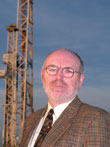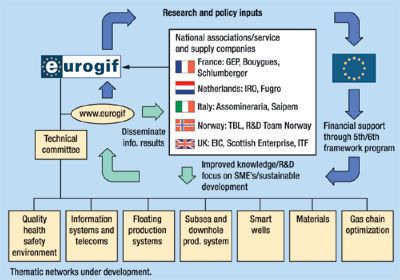United Kingdom: European countries cooperate on needed industry technology
Apr. 2002 Vol. 223 No. 4 European Technology Round Up
Brian G. Redden, Principal Consultant, Nautilus Associates Ltd., also serves as "Manager" of the UK Assist program, established by the UK Department of Trade & Industry and Scottish Enterprise, through a contract with the organization. In the following discussion, he updates some of the European Commission’s objectives, and status of its Framework program for industry R&D. The goals of EUROGIF and status of eight of its Thematic Network programs are discussed. And the goals of the new UK-Assist organization, and how it will work closely with other groups, are outlined. Editor’s note: 1) the background of the European Commission, its role with the European Union, and the group’s charter / goals; 2) a review of EUROGIF (the European Oil & Gas Innovation Forum); 3) an update of EUROGIF’s operations, its formation of the Thematic Network (TN) program; and 4) the UK’s ITF (Industry Technology Facilitator) program have been featured in previous World Oil April issues.1 – 4 Q. Mr. Redden, can you outline some relevant objectives of the EC? A. The four main "energy-policy"-related objectives of the EC are noted in the table, together with a note against each on how EUROGIF activities help to contribute toward achieving them. Q. What is EUROGIF’s present status? How do the EC and EUROGIF work together for the oil/gas industry? A. EUROGIF is a membership-based alliance formed between the European trade associations and contractors in the engineering, service and supply sector of the offshore industry. Its purpose is to represent that membership to the EU and EC to increase industry’s competitiveness by developing / employing innovative and high-technology solutions.
EUROGIF membership is made up of the industry trade associations from the five European countries primarily involved in the hydrocarbon sector (UK, Norway, the Netherlands, France and Italy) and four large contractors (Schlumberger, Fugro, Bouyges Offshore and Saipem. The EUROGIF member associations together represent more than 2,650 European small and medium-sized enterprises (SMEs) with some one million employees. EUROGIF is registered in Belgium as a "not-for-profit" organization and its Secretariat is based in Brussels. It is managed by a board drawn from its membership and chaired by an elected president. At this time, Dai Somerville-Jones, the Chief Executive Officer of EIC, holds this position. Dr. Gabriel Marquette from Schlumberger is Vice President and is also Chairman of the EUROGIF technical committee. The four main aims of EUROGIF are to:
EUROGIF achieves these aims by meeting regularly with members of the European Parliament and maintaining a close working relationship at all levels with EC officials, as seen in the accompanying figure.
Q. Can you summarize the Thematic Network program? A. A prime activity of EUROGIF, additionally, is its promotion / coordination of a number of oil/gas industry Thematic Networks (TN), which are clusters of organizations with common interests in a market / technology area. The EC’s Fifth Framework Research and Technology Development (RTD) program (FP5) offered funding for TNs to "bring together, e.g., manufacturers, users, universities, research centers, etc., around a given science and technology objective." In response to this, EUROGIF reviewed the main technology areas in the FP5 Program and produced an overview description of eight TNs which cover the main technology areas of the offshore (upstream) oil/gas industry. These eight programs and their current status are: TN:1 – QHSE (Quality, Health, Safety and Environment). Now called TRENDS (The Resource Network facilitating QHSE Development for a Sustainable Energy Industry). The network, led by Det Norske Veritas, has some 45 organization members from across Europe. TRENDS was awarded funding of †1.6 M for a 3-yr program starting in November 2001. TN:2 – Enabling ICTs for competitive exploitation of natural resources. The network is led by SchlumbergerSema (Spain) and has some 17 organizations in the consortia. It submitted an unsuccessful proposal in October 2001, which will be re-submitted during 2002. TN:3 – Floating Structures Technology, now called FLOATTECH. The network, led by Aker Maritime, has 37 member organizations. It was awarded funding of †1.5 M for a three-year program, starting September 2001. TN:4 – Subsea & Downhole Production Systems. Now called SEARCH (Subsea and Downhole Environmentally Attractive Research and Solutions for Cost Effective Hydrocarbon Recovery). TN:5 – Smart Wells. The network led by Schlumberger submitted an application in December 2001 and expects an answer before summer 2002. TN:6 – Materials. The initial TN scope was perceived by the EC to be "too broad," so EUROGIF has incorporated elements of the planned workscope into other networks. TN:7 – Gas Chain Optimization (now called ENVIRONMENT GAS TEC). The network is led by Bouyges Offshore, with 32 organizations in its consortium. It was awarded funding of †1.5 M for its three-year program, starting November 2001. TN:8 – CO2 Sequestration. Led by Technology Initiatives, it expects to hear whether funding has been awarded before summer 2002. The purpose of each TN is to represent its technology sector (usually with 20 to 50 organizations from across Europe involved), then act as an expert industry advisor group to the EC. EUROGIF coordinates TN activities through its Technical Committee, with one member from each network. And it disseminates information on its activities through semi-annual forums, usually in Brussels. Q. What are some specific oil industry programs in effect for these organizations? A. There really are no "specific oil industry programs," as such. The EC spends its RTD (this stands for Research and Technology Development and is EU-speak for R&D) budget in four-year tranches called a "Framework" program. Framework (known as FP) is means by which the EC spends money on R&D. Each FP covers a four-year period. The current FP5 runs from 1998 to third quarter 2002. The next, FP6, is due to start fourth quarter 2002 and run through 2006. Within FP5, there is only one key action area which specifically addresses oil and gas industry issues. This is Key Action 6.4 of Part B: (ENERGIE) of the Energy, Environment & Sustainable Development (EESD) program. KA 6.4 is designed for more efficient exploration, extraction / production technologies. The objective is to allow more efficient identification of resources available worldwide, and particularly within the EU, and to optimize their exploitation, reducing costs and environmental impact through technologies which will be more competitive in global markets, while enhancing health and safety. Q. What has been the response of the major oil companies to EC programs? Do they participate, or are the principal contributors contractors / suppliers and research institutes? A. The short answer is really "yes" to the second part of the question. In general terms, it can be said that the oil companies have less interest in EC funding because: 1) the application procedures are seen as time-consuming and bureaucratic; and 2) the timeframes do not usually fit with the fast-moving offshore technology development environment. Having said this, some of the major oil companies do see the benefit of EC RTD funding and have benefited from some sizeable contributions to projects over the years. Realistically, the situation is that the oil companies virtually ignore the EC for the reasons stated above and, as a result, the EC tends to ignore them. The small number of organizations which represent the oil/gas industry therefore have a tough time getting the message across. Even when that message is supported by national governments, it still tends to be overlooked by the EC because oil and gas is not given a high priority. When it comes to discussion in the European Parliament and its committees, the industry loses out because only five or maybe six of the EU members have any real "offshore industry" involvement. When it comes to a vote on oil/gas or "other" industrial sectors getting funding, the O&G industry loses. Q. What is ITF? A. ITF, or the UK’s Industry Technology Facilitator, is a "not for profit" organization funded by contributions from a number of oil companies. The reason the oil companies fund ITF is so that it can act as an "honest broker" between them (the "demand" side of the industry) and the service / supply sector of the industry (the "supply" side). The way that ITF operates is that it keeps a close working relationship with its oil company members and constantly gets from them their "wish lists" of new technologies, or is fed information about their "technical problems" which need to be solved. It also keeps close tabs on the technology developers and, in various ways, endeavors to match what is needed by the demand side with what is available from the supply side. The way it does this is to act as facilitator of JIPs. It will marry the partners, then drop out of the scene because it has no remit to get involved in managing technology development programs per se. For current information on ITF’s programs and status, readers can contact the organization through its web site, www.oil-itf.com. The EUROGIF address, incidentally, is www.eurogif.com. Q. Are there any other organizations or programs with government support open to the oil/gas industry to assist in developing or promoting new technologies? A. Yes, UK-Assist. This is a "not-for-profit" (NFP) organization established jointly by the UK Department of Trade & Industry and Scottish Enterprise (the national economic development agency for Scotland). It is co-located in Exploration House, Aberdeen, with the three other NFP organizations established under the UK PILOT initiative. These are: ITF, LOGIC (Leading Oil and Gas Industry Competitiveness), and NOVA (a risk-sharing venture capitalist). The primary role of UK Assist is to be the "energy industry expert" within the UK NCP (National Contact Point) network, providing an interface between the UK service / supply sector, the emerging offshore-based renewable energy sector and the EC, to promote new technology development, transfer of technology and diversification. This is accomplished in a number of ways, such as: 1) maintaining a website providing information about EC Framework program opportunities and other sources of help / information, at www.ukassist.com; 2) quarterly publication of the newsletter UK Assisting; and 3) publication of technical / market briefings which explain / expand on calls for proposals issued by the EC Framework Program and provide information on other opportunities / developments in oil/gas renewable energy sectors. Other activities include:
UK Assist works closely with EUROGIF. Its manager attends all board and technical committee meetings and chairs the EUROGIF Image and PR group. It has good working relationships with all public-sector agencies involved in supporting the UK energy industries as well as the trade associations EIC, NOR, SSTG and Isocon. Literature Cited 1 Garnish, J. D., "The European Commission’s role in oil/gas technology development," World Oil, April 1999, pp. 88 – 93. 2 Krummacher, G., "EUROGIF: Helping Europe’s service / supply industry," World Oil, April 1999, pp. 92 – 93. 3 Wille, S. T., "EUROGIF: Advancing environmentally sound oil/gas technologies," World Oil, April 2000, pp. 72 – 75. 4 Ellix, Dr. D., "ITF addresses technology needed for North Sea viability," World Oil, April 2000, pp. 78 – 82.
|
|||||||||||||||||||||||||||||||||||||||||||||||||





